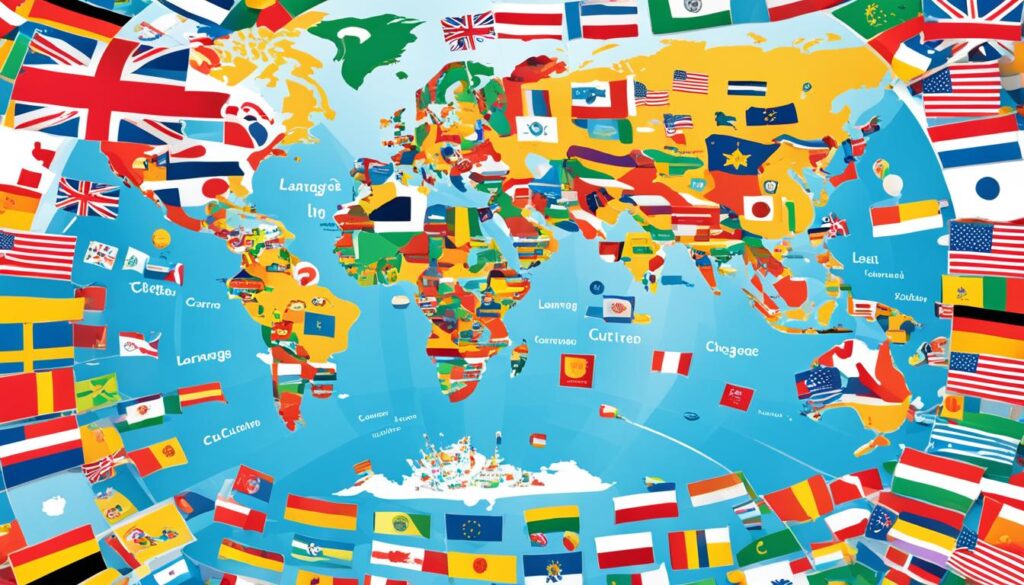Language education plays a crucial role in developing global competence, which is the ability to understand and engage with the world in an interconnected and culturally diverse context. It equips individuals with the necessary knowledge, skills, and attitudes to navigate global challenges and contribute to a more inclusive and sustainable world. Language education provides learners with the tools to communicate effectively, understand different perspectives, and navigate cross-cultural interactions. By fostering linguistic proficiency and cultural awareness, language education prepares individuals to engage in global citizenship and thrive in an increasingly interconnected world.
Key Takeaways:
- Language education plays a crucial role in developing global competence.
- Global competence enables individuals to understand and engage with the world in a diverse context.
- Language education fosters linguistic proficiency and cultural awareness.
- Effective communication, understanding different perspectives, and navigating cross-cultural interactions are essential in building global competence.
- Language education prepares individuals to thrive in an interconnected world and engage in global citizenship.
Understanding Global Competence and Its Significance
In today’s interconnected world, global competence has become increasingly important in fostering effective communication, collaboration, and problem-solving across cultures.
Defining Global Competence in a Modern Context
Global competence refers to the knowledge, skills, and dispositions necessary to understand and engage with complex global issues in an interconnected world. It goes beyond linguistic proficiency to encompass cultural awareness, empathy, critical thinking, and the ability to work collaboratively with individuals from diverse backgrounds. Global competence empowers individuals to navigate cross-cultural interactions, respect diversity, and contribute to a more inclusive and sustainable world.
The Interconnectedness of Today’s World and Importance of Cultural Awareness
In an interconnected world, cultural awareness plays a crucial role in fostering meaningful connections and effective communication. Cultural awareness involves recognizing and respecting the values, beliefs, and customs of different cultures. It enables individuals to navigate cross-cultural interactions with sensitivity, adaptability, and open-mindedness. By developing cultural awareness, individuals can bridge cultural gaps, break down stereotypes, and build inclusive environments that promote understanding and collaboration.
Secretary of Education Arne Duncan’s Views on Language Education as a Necessity
Arne Duncan, former Secretary of Education, emphasized the importance of language education as a necessity for preparing students to succeed in a globalized world. He recognized that language education provides students with tools to thrive in an interconnected world by fostering communication skills, cultural understanding, and global awareness. Duncan advocated for increased access to language courses and overseas educational experiences, emphasizing that they should be considered essential components of a well-rounded education.
Language Education Journey: Enhancing Global Readiness
The language education journey is a transformative process that prepares individuals to be globally ready by equipping them with the necessary skills and knowledge to engage with the world. Through language education, learners embark on a path of linguistic proficiency, cultural understanding, and global awareness. This journey involves continuous learning, exposure to diverse cultural contexts, and the development of global competence. Language education provides individuals with the tools they need to communicate effectively, understand and appreciate diverse perspectives, and navigate global challenges.

Language education serves as a bridge that connects individuals across borders, fostering intercultural communication and collaboration. By learning a new language, individuals gain insights into different cultures, traditions, and ways of thinking. They develop empathy and a deeper appreciation for diversity, fostering a sense of global citizenship and intercultural competence. Language education also enhances critical thinking and problem-solving skills, as individuals learn to navigate language barriers and adapt to different cultural practices.
Furthermore, language education goes beyond linguistic proficiency. It enables individuals to understand the historical, social, and political contexts of different cultures, contributing to a more comprehensive understanding of the world. By studying languages, learners gain access to a wealth of knowledge and resources that can shape their perspectives and broaden their horizons.
Language education can take various forms, including formal classroom instruction, cultural immersion programs, online language courses, and study abroad opportunities. Each of these avenues offers unique opportunities for individuals to enhance their language skills and develop global readiness. Whether through engaging with native speakers, participating in cultural activities, or utilizing technology, language learners can immerse themselves in authentic language and cultural experiences.
As individuals progress on their language education journey, they not only gain proficiency in a new language but also develop the skills and competencies necessary for global citizenship. They become equipped with the ability to communicate effectively across cultures, navigate diverse social contexts, and make meaningful contributions to an interconnected world.
The language education journey is a lifelong endeavor that enables individuals to continuously expand their global readiness and enhance their global competence. By embracing language education, individuals can broaden their perspectives, connect with people from different backgrounds, and contribute to a more inclusive and harmonious global society.
The Role of Language Proficiency in Fostering Global Citizenship
Language proficiency plays a crucial role in fostering global citizenship, as it enables individuals to communicate effectively across cultures and engage in meaningful interactions. When individuals have a high level of language proficiency, they can navigate communication barriers and establish connections with people from different cultural backgrounds. This proficiency empowers individuals to participate actively in global conversations, contribute to global problem-solving, and build bridges of understanding.
Proficiency vs. Competence: Addressing the Critical Differences
It is important to distinguish between language proficiency and competence to fully understand their impact on global citizenship. Language proficiency relates to the ability to use a language accurately and fluently. It encompasses grammar, vocabulary, pronunciation, and comprehension. Proficient language speakers can express themselves clearly, understand nuanced meanings, and engage in complex conversations in the target language.
On the other hand, language competence extends beyond linguistic abilities. It includes cultural understanding, critical thinking, and empathy. Competent language speakers not only have the language skills but also possess a deep understanding of the cultural norms, behaviors, and values associated with the language. This broader range of skills allows them to navigate cross-cultural interactions with respect, sensitivity, and openness.
The integration of language proficiency and competence is key to fostering global citizenship. While proficiency provides the foundation for effective communication, competence enhances cultural understanding and facilitates meaningful connections between individuals from diverse backgrounds.
Social and Emotional Skills Linked to Language Learning
Language learning goes beyond linguistic development and encompasses the cultivation of social and emotional skills that are vital for global citizenship. The process of learning a new language requires perseverance, adaptability, and resilience, as learners navigate new grammatical structures, vocabulary, and pronunciation.
Through language learning, individuals develop empathy as they gain insights into different cultural perspectives and understand the nuances of communication. They learn to appreciate and respect diversity, fostering an open-minded and inclusive mindset. Language learners also enhance their critical thinking skills by analyzing and interpreting unfamiliar texts, expressing their thoughts, and engaging in debates and discussions.
Additionally, language learning promotes adaptability as individuals immerse themselves in different cultural contexts and learn to navigate new environments. This adaptability enables them to connect with people from diverse backgrounds, embrace change, and thrive in multicultural settings.
Overall, language proficiency plays a vital role in fostering global citizenship by enabling effective communication across cultures. Integrating the broader skills of competence enhances cultural understanding and empathy, facilitating meaningful connections. Moreover, language learning develops social and emotional skills crucial for successful cross-cultural interactions. By nurturing language proficiency and fostering competence, language education equips individuals with the tools they need to become active global citizens.
Integrating Language Learning Techniques Within Classrooms and Beyond
Integrating language learning techniques within classrooms and beyond traditional educational settings is crucial for enhancing language acquisition and fostering global competence. In classrooms, teachers can incorporate interactive activities, authentic materials, and real-world contexts to engage students and promote language proficiency.
Beyond classrooms, language learning can be reinforced through cultural immersion experiences, language exchange programs, and online resources. By integrating language learning techniques in various contexts, individuals have more opportunities to practice and apply their language skills, further enhancing their global competence.

| Language Learning Techniques | Benefits |
|---|---|
| In-class interactive activities | Engages students, promotes language proficiency |
| Authentic materials | Exposes students to real-world language use |
| Real-world contexts | Encourages practical application of language skills |
| Cultural immersion experiences | Provides firsthand exposure to different cultures |
| Language exchange programs | Facilitates language practice with native speakers |
| Online resources | Allows for self-paced learning and access to diverse language materials |
Innovative Language Learning Tips and Online Language Courses
Innovative language learning tips and online language courses are valuable resources that can significantly enhance your language acquisition and global competence. These tools provide individuals with additional support and opportunities to improve their language skills in a dynamic and accessible way.
Flipping the Language Classroom: A Modern Approach to Language Acquisition
One innovative approach to language acquisition is flipping the language classroom. This method involves using technology to deliver instructional content outside of class time, allowing for more interactive and collaborative learning experiences during class.
By utilizing digital resources and online platforms, language learners can access lesson materials, videos, and exercises at their own pace and convenience. This gives them the flexibility to review concepts, practice pronunciation, and engage with language activities beyond the traditional confines of the classroom.
The flipped classroom model promotes active learning by incorporating real-world language use, problem-solving activities, and cultural exploration. It encourages learners to take ownership of their language learning process and empowers them to actively engage with the language in meaningful ways.
Leveraging Technology for Language Learning and Cultural Exchange
Technology plays a fundamental role in language learning and cultural exchange. Online language courses, interactive language apps, virtual language exchange programs, and authentic online resources have revolutionized the way we learn languages.
The widespread availability of online language courses allows learners to access high-quality language instruction from anywhere in the world. These courses often incorporate multimedia elements, interactive exercises, and gamified learning strategies to make language learning more engaging and enjoyable.
In addition to online language courses, technology enables cultural exchange by connecting language learners with native speakers and individuals from diverse cultural backgrounds. Virtual language exchange programs provide opportunities for language learners to practice their speaking skills with native speakers in a supportive and immersive environment.
Furthermore, technology offers access to a wide range of authentic language materials, such as movies, music, podcasts, and news articles, allowing learners to immerse themselves in the target language and develop cultural understanding.
By leveraging technology for language learning and cultural exchange, learners can benefit from personalized and interactive language instruction, engage in real-world language use, and develop a deeper appreciation for different cultures.
| Benefits of Innovative Language Learning and Online Language Courses | |
|---|---|
| Flexibility | Online language courses provide learners with the flexibility to study at their own pace and schedule, fitting language learning into their busy lives. |
| Personalized Learning Experience | Interactive language apps and online platforms offer personalized learning experiences tailored to individual needs and language proficiency levels. |
| Cultural Exposure | Online resources and virtual language exchange programs offer cultural exposure by providing access to authentic language and cultural materials. |
| Global Connectivity | Technology-enabled language learning connects learners with native speakers and individuals from around the world, fostering global connections and cultural exchange. |
Overall, innovative language learning tips and online language courses provide invaluable tools for language acquisition and global competence. By embracing technology and engaging in cultural exchange, learners can enhance their language skills, expand their cultural understanding, and effectively communicate and connect with people from diverse backgrounds.
Supporting Educational Equity Through Access to Language Education
Ensuring access to language education is essential for promoting educational equity and fostering global competence among all learners. Language education should be made accessible to students from diverse backgrounds, including marginalized communities and non-native English speakers. Providing equitable access to high-quality language education opportunities, such as dual language programs, support services for English language learners, and culturally responsive teaching practices, helps level the playing field and empowers all students to develop the necessary skills and competencies for global citizenship.
Cultivating Language Fluency in the Age of Global Interactions
Developing language fluency is essential in today’s interconnected world, where global interactions and cross-cultural communication are becoming increasingly prevalent. Achieving fluency in a language allows individuals to engage in effective and meaningful conversations, fostering understanding and collaboration across borders. However, building language fluency can be challenging, requiring effort and dedication to overcome various obstacles.
Overcoming the Challenges of Building Language Fluency
Language fluency involves more than just acquiring vocabulary and grammar knowledge. It requires overcoming obstacles that hinder the development of proficiency. Some of the common challenges individuals face in building language fluency include:
- Limited exposure to authentic language contexts: Language learners often struggle to find opportunities to practice their language skills in real-life situations. Without exposure to authentic language contexts, it can be difficult to develop a natural flow and grasp cultural nuances.
- Lack of immersion opportunities: Immersion, where learners are fully surrounded by the target language, is an effective way to accelerate language learning. However, finding immersion opportunities can be a challenge, particularly for individuals who do not have access to native speakers or language-rich environments.
- Maintaining consistency in language practice: Consistency is key in language learning. However, maintaining a regular study routine and practicing consistently can be demanding and require motivation and discipline.
Despite these challenges, there are strategies individuals can employ to overcome them and cultivate language fluency.
Immersion Programs as a Key Component of Language Fluency

One effective approach to building language fluency is through immersion programs. Immersion programs provide learners with an intensive and immersive language learning experience by placing them in an environment where the target language is spoken and used daily. These programs offer several benefits:
- Consistent exposure: Immersion programs provide learners with consistent exposure to the target language, allowing them to practice and develop their language skills in real-life situations.
- Authentic language use: By immersing themselves in a target language environment, learners have the opportunity to engage in authentic language use, reinforcing their understanding of vocabulary, grammar, and cultural context.
- Cultural integration: Language learning is intertwined with cultural understanding. Immersion programs provide learners with a deeper understanding of the culture associated with the language they are studying, enabling them to interact more effectively and respectfully with native speakers.
Through a combination of consistent exposure, authentic language use, and cultural integration, immersion programs offer a comprehensive and effective method for building language fluency.
Language Study Abroad and Immersion Programs: Real-world Benefits
Language study abroad and immersion programs offer real-world benefits in terms of language acquisition, cultural understanding, and personal growth. By studying abroad or participating in immersion programs, individuals have the opportunity to fully engage with a language and culture, practice language skills in authentic contexts, and develop a deeper understanding of cultural nuances.
Language study abroad and immersion programs also provide individuals with the chance to broaden their perspectives, develop independence and resilience, and build global networks. Through immersive experiences, learners can enhance their language fluency, as they are immersed in real-world situations that require communication in the target language. This type of exposure accelerates language acquisition and provides learners with the confidence and ability to communicate effectively in diverse cultural settings.
Furthermore, participating in language study abroad and immersion programs fosters cultural understanding and sensitivity. By living and interacting with native speakers, individuals gain firsthand experiences of different customs, traditions, and perspectives, which contributes to their overall global competence. Immersion programs also offer opportunities for personal growth, allowing learners to develop independence, adaptability, and problem-solving skills as they navigate through unfamiliar environments and cultural challenges.
“Language study abroad and immersion programs offer individuals the chance to truly immerse themselves in the language and culture, providing a unique and transformative experience. It allows learners to step out of their comfort zone, embrace new experiences, and develop a deep appreciation for cultural diversity.” – Language Study Abroad Advocate

Language study abroad and immersion programs are not only valuable for language learning but also for personal and professional development. Employers and academic institutions recognize the real-world benefits of these programs, as they provide individuals with a competitive edge in an increasingly globalized world.
Overall, language study abroad and immersion programs offer a unique and immersive learning experience that goes beyond traditional classroom settings. They provide learners with the necessary tools to navigate global challenges, develop cross-cultural competencies, and thrive in an interconnected world.
Conclusion
In conclusion, building global competence through language education is crucial for equipping individuals with the skills and knowledge to navigate a rapidly changing and interconnected world. Language education plays a vital role in developing global competence by fostering linguistic proficiency, cultural awareness, and the ability to communicate effectively across cultures.
The future implications for educators and policy makers in language education involve ensuring equitable access to language education, integrating innovative language learning techniques, leveraging technology, and promoting cultural exchange. By prioritizing language education and global competence, educators and policy makers can prepare future generations to thrive in an increasingly globalized and diverse world.
FAQ
What is global competence?
Global competence refers to the knowledge, skills, and dispositions to understand and engage with complex global issues and work collaboratively with individuals from diverse cultural backgrounds.
Why is cultural awareness important in today’s interconnected world?
In today’s interconnected world, understanding different cultures and perspectives is crucial for effective communication and problem-solving.
What is Arne Duncan’s view on language education?
Arne Duncan, former Secretary of Education, emphasized the importance of language education as a necessity for preparing students to succeed in a globalized world.
What is the language education journey?
The language education journey is a process that enhances individuals’ global readiness by equipping them with the necessary skills and knowledge to engage with the world.
What is the difference between language proficiency and competence?
Proficiency refers to the ability to use a language accurately and fluently, while competence encompasses a broader range of skills, including cultural understanding, critical thinking, and empathy.
What are social and emotional skills linked to language learning?
Language learning enhances social and emotional skills such as empathy, resilience, and adaptability, which are essential for successful cross-cultural interactions and global citizenship.
How can language learning be integrated within classrooms and beyond?
Language learning can be integrated within classrooms through interactive activities, authentic materials, and real-world contexts. It can also be reinforced beyond classrooms through cultural immersion experiences, language exchange programs, and online resources.
What are some innovative language learning tips and online language courses?
Innovative language learning tips and online language courses provide individuals with additional resources and tools to enhance their language acquisition and global competence.
Why is access to language education important for promoting educational equity?
Ensuring access to language education promotes educational equity by leveling the playing field and empowering all students, including marginalized communities and non-native English speakers, to develop the necessary skills and competencies for global citizenship.
How can language fluency be built?
Language fluency can be built by overcoming challenges such as limited exposure to authentic language contexts, lack of immersion opportunities, and maintaining consistency in language practice.
What are the benefits of language study abroad and immersion programs?
Language study abroad and immersion programs offer real-world benefits in terms of language acquisition, cultural understanding, personal growth, and the development of independence and resilience.
Source Links
- https://www.oecd.org/education/Global-competency-for-an-inclusive-world.pdf
- https://www.gettingsmart.com/2016/03/29/world-language-learning-global-competence-complement/
- https://www.gettingsmart.com/2017/09/05/educating-for-global-competence-6-reasons-7-competencies-8-strategies-9-innovations/

